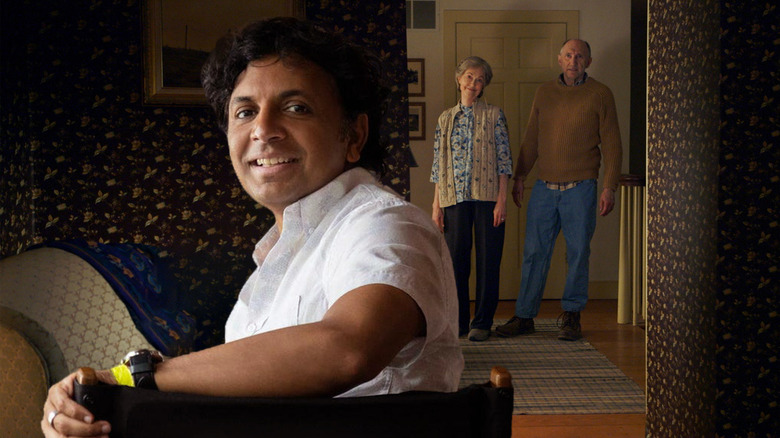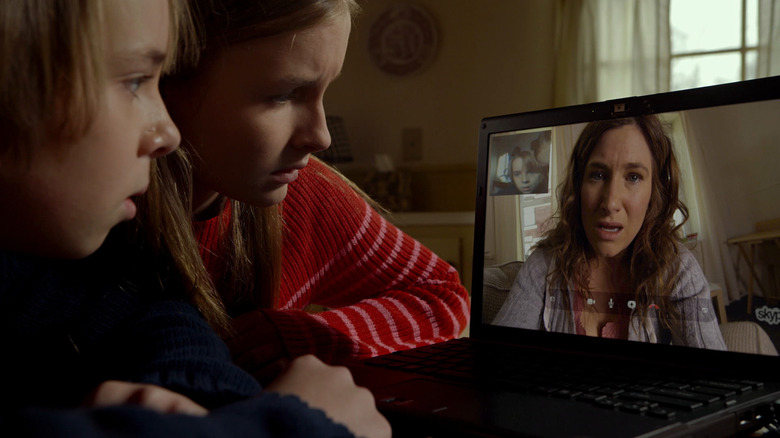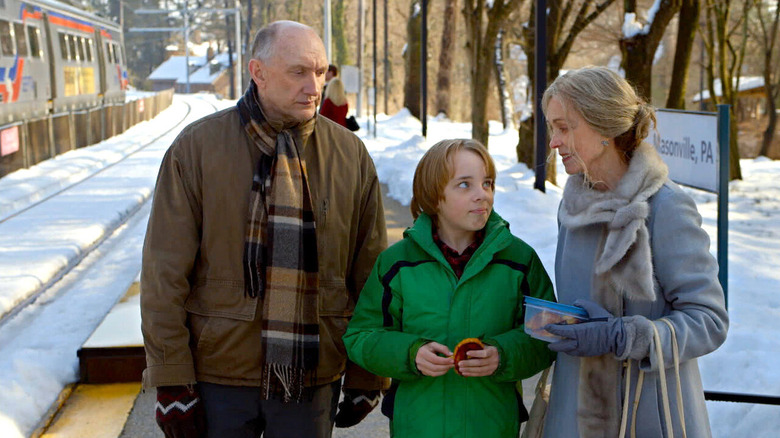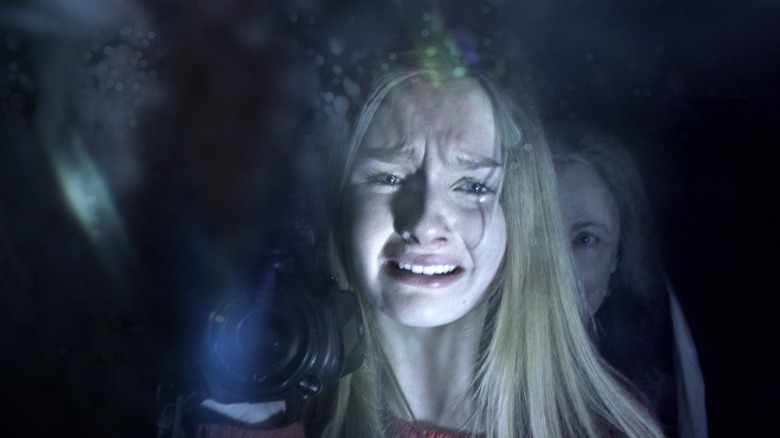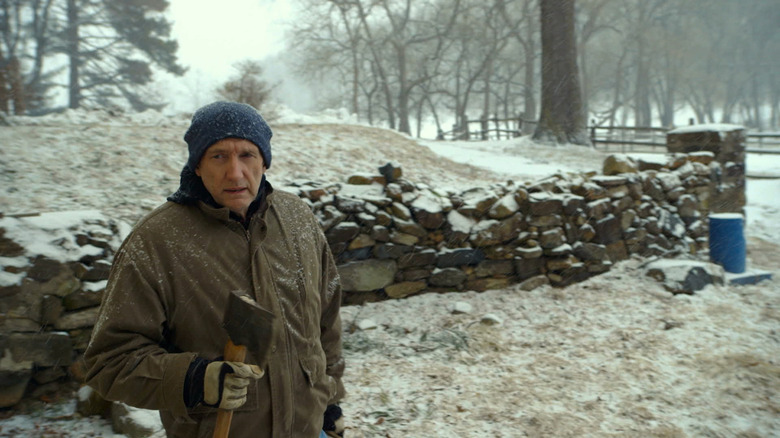Tales From The Box Office: M. Night Shyamalan's Low Budget Thriller The Visit Kicked Off His Big Comeback
(Welcome to Tales from the Box Office, our column that examines box office miracles, disasters, and everything in between, as well as what we can learn from them.)
M. Night Shyamalan is a name that is downright synonymous with moviegoing. The filmmaker's career began by being shot out of a cannon, with his studio feature directorial debut, 1999's "The Sixth Sense," becoming an absolute sensation that set sky-high expectations for him. Some even called him the next Steven Spielberg. No pressure!
That's not exactly how things panned out. While Shyamalan did have several other hits with "Unbreakable" and "Signs," even by 2004's "The Village," the whole "where's the twist?" thing had started to catch up to him. The burden of audience expectations was, fair or not, being placed heavily upon his shoulders.
Things really started going sideways with the widely-panned "The Happening," which was followed by his big-budget, back-to-back bad turns with "The Last Airbender" and "After Earth." Those legendarily bad flops left the once-promising director in a bad place with critics, audiences, and even studios. Where was he to turn?
The answer was to go about as small as one could go with a tiny, self-financed found-footage flick in the form of "The Visit," which ultimately became a huge hit and revived Shyamalan's career in a massive way. In honor of the filmmaker's latest film, "Knock at the Cabin," we're looking back at "The Visit," how it came to be, how he had a very difficult time finding a home for it, how it managed to set him back on the path to success, and what lessons we can learn from it in the modern context. Let's dig in, shall we?
The movie: The Visit
It cannot be overstated just how bad things looked for M. Night Shyamalan after "The Last Airbender" and "After Earth." The former was a 2010 adaptation of a beloved animated show that cost $150 million to produce and made just $319 million worldwide. More to the point, the reviews were downright scathing and killed a would-be franchise. "After Earth," meanwhile, was just as bad, earning $251 million worldwide in 2013 against a huge $130 million budget. Couple that with preceding critical failures like "Lady in the Water," and you've got a recipe for trouble.
What was Shyamalan to do? After spending some time thinking it over, the filmmaker took a big bet on himself and took out a $5 million loan against his house to self-finance his next picture, which we would come to know as "The Visit." He had no studio partner when he began production, and had no guarantee of distribution. Be that as it may, he wanted to set himself on the right path and was willing to risk millions of his own money to do so.
The movie was originally called "Sundowning" and was flying pretty under the radar when it entered production in early 2014. It focuses on a single mother (Kathryn Hahn) whose two young children (Olivia DeJonge and Ed Oxenbould) visit their grandparents (Deanna Dunagan and Peter McRobbie) in the country. Things start out a bit strange, but over time, they devolve into straight-up nightmare fuel. Sure, there is a little twist at the end, but it's nothing like the "Bruce Willis was dead the whole time" bombshell that Shyamalan couldn't get out from under for all those years. This was, at the end of the day, a simple, small horror film that was more of a crowd-pleaser. Getting to a final cut, however, wasn't easy.
A fortuitous (but long) stay in the editing room
Once the film was in the can, the real trouble started. M. Night Shyamalan was left to his own devices in the editing room, and he had some real trouble putting together a movie that anyone wanted to release. A 2018 Rolling Stone profile of the director revealed that just about every single studio in town turned down his first cut of the feature.
Shyamalan was worried he was going to lose millions and be stuck with a movie nobody wanted. But that was before he recut the movie into something Universal was interested in, with Blumhouse head Jason Blum also getting on board, given his place as the emerging king of low-budget horror. Speaking with Bloody Disgusting ahead of the film's 2015 release, the director elaborated on the brutal editing process:
"This one took me a long time to edit. Much longer than I thought. The very first cut that I put together was like a full-on art house film. Then I went comedy, like it had all of these comedic tones, then I was like, 'You know what? Let's anchor this as a thriller.' Once I came to the conclusion that the predominant spine of the movie was indeed a scary thriller that becomes a horror film, then I knew which of the other things ... the artsy things ... the humorous things ... could stay in service of the movie."
Universal's marketing kicked off in earnest, with the first trailer attached to screenings of the found-footage flick "Unfriended" in 2014. That proved to be a good strategy, as "Unfriended," another micro-budget film, turned into a $62 million hit. And so, the stage was set for a much smaller Shyamalan picture to enter the fold and help build back his good name. Spoilers: It worked perfectly.
The financial journey
Universal released "The Visit" in theaters on September 11, 2015, with more positive than negative reviews. September has historically been a dead zone for big films, and the timing provided an opportunity for something like this to sneak in and grab some cash. M. Night Shyamalan's lowkey comeback picture was opening against "The Perfect Guy," a movie that arguably few remember aside from those who saw it in theaters that year. It was a thriller with a much higher budget, however, that most figured would win the weekend — which it did, albeit by just a hair.
"The Perfect Guy" topped the charts with $25.9 million while "The Visit" barely placed in second with $25.4 million. But as we talk about frequently around these parts, it's all relative. With such a small budget, Universal and Blumhouse didn't need much to become a hit. And in the weeks that followed, "The Visit" held better than "The Perfect Guy," even against bigger competition from the likes of "The Maze Runner: The Scorch Trials," "Hotel Transylvania 2," and "The Martian."
In the end, the horror/thriller finished its run with a $65.2 million domestically and $33.2 million internationally for a grand total of $98.4 million — there's nothing like making nearly 20 times your production budget to put a guy back on the right track. Safe to say, Shyamalan got his money back. What's more, he found a home and new business partner in Universal, who has teamed with him on every movie since including "Split" ($278 million worldwide/$9 million budget), "Glass" ($247 million worldwide/$20 million budget), and "Old" ($89 million worldwide/$18 million budget), as well as "Knock at the Cabin" which, again, looks to be a big hit.
The lessons contained within
What's most amazing about the run that M. Night Shyamalan has had since "The Visit" is that he continues to self-finance his movies. Yes, he partners with a major studio for marketing and distribution, but what he accomplished with this little found-footage horror flick stuck with him and completely changed the way he approached his career from that point forward.
No more $100 million, massive blockbuster tentpoles. No more getting caught on the wrong end of someone else's movie — just him betting on himself and his ideas, relatively uninhibited. Shyamalan explained why he continued down that path in 2019 when "Glass" was coming out:
"I get the financial incentives, but what's the creative upside of a small budget? It allows me to do whatever I want. Cast whomever, crew whomever, shoot it however, reshoot however, don't shoot whatever. Take huge risks. Look at 'Split.' If I said I was going to pitch you a movie, and I come into the studio system and said, 'Here's the movie, guys. Girls get abducted.' Already, the pitch is over. The pitch is over."
Shyamalan's approach comes from the privilege of having a profitable career for nearly two decades before things went south, but the lesson of leaning into one's strengths as a creator is profound. The sheer integrity of what Shyamalan is willing to risk to do things his way for nearly a decade is difficult not to respect. Self-financing aside, filmmakers and moneymen would do well to look at the riches that followed when Shyamalan got away from the "bigger = better" mentality that far too often permeates this business. In short? More of "The Visit" and less of "After Earth."
